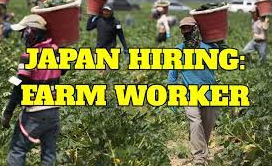
Farm Worker In Japan For Foreigners
Farm Work In Japan For Foreigners

Farm Worker In Japan For Foreigners. When you plan to apply
for farm jobs in Japan, there are a number of important factors to consider.
These include whether you are an intern, whether you'll be paid by the bucket
or by the hour, and whether you're eligible for a working holiday visa. Here are
some helpful tips to help you get started. Read on to learn about these
important issues. Here is a list of websites that will help you find the best
farm jobs in Japan.
Fruit picking jobs in Japan:
When you're looking for
fruit picking jobs in Japan, you'll be pleasantly surprised to discover that
there are many options available. You can work as a seasonal fruit picker, or
you can find full-time employment in the agriculture industry. There are
several types of fruit picking jobs in Japan, and it's important to remember
that you'll be required to adhere to strict guidelines for the quality of your
work.
Japanese fruit is best
eaten when it's in season, so fruit picking is very popular during the autumn
and spring seasons. Apple picking is also easy to access from Tokyo, and the
experience can be both family-friendly and unforgettable. Here are some of the
best fruit picking jobs in Japan for foreigners. You can enjoy a relaxing day
with the family while bringing back the freshest fruit to your home country.
You can also pick apples, plums, and other seasonal fruits.
To work as a fruit picker
in Japan, you must have basic Japanese language skills. If you do not know the
language, you can try enrolling in a language course online or in nearby
cities. Depending on the location, you may have to speak Japanese as the
Japanese are often reticent about it. Moreover, a working visa is required, and
some employers provide housing packages. To ensure that you have a comfortable
stay, rent a studio apartment. Housing in a foreign country can be confusing,
so do your research ahead of time.
While it is important to
note that there are no specific skills required for fruit picking jobs in
Japan, there are opportunities available all year round. Some farms are open to
walk-ins, while others require advance reservations. Whether you're interested
in working in the fruit picking industry or not, you'll find that the market is
a good one. You can even find part-time fruit picking jobs in Japan. If you're
looking for a part-time job or a full-time position, you can start as soon as
you're qualified and have experience.
Limited to interns:
As the country's
agricultural workforce has dwindled over the decades, farm owners are
increasingly looking to other sources of labor. While the number of foreign
farm workers has nearly quadrupled from 0.5 percent to 2 percent in the past
decade, most foreigners who work on farms in Japan do so through the Technical
Intern Training Program, which is limited to five years. This ban has posed many
challenges to foreigners seeking farm work in Japan.
The country's recent
omicron virus outbreak has also put a damper on the situation, limiting
foreigners to interns. However, the high demand for foreign agricultural labor
has prompted many Japanese companies to consider the possibility of importing
low-skilled workers from abroad. In order to attract these foreign workers, the
government has introduced a Technical Intern Program. This program is supposed
to train workers from developing Asian countries to work on farms.
Many foreigners have
tried to apply for farm work in Japan, but the restrictions are often too
tight. Many farmers rely on these interns. These interns do not enjoy the same
labor protections as other Japanese employees. For instance, if a plant owner
decides to cut off a Chinese intern, he may be forced to evict them from their
company-provided housing.
While the Japanese
government has issued warnings to employers to avoid firing pregnant workers,
many technical interns try to cover up their pregnancies and hide their babies.
In one case, a Vietnamese intern tried to hide her pregnancy while attempting
to have twins. After she was arrested, she was sentenced to three months in
prison for abandoning the babies, and her case is currently being appealed by
the Kumustaka association.
Pay by bucket instead of by the hour:
The Japanese farm
industry has made strides to improve hiring practices for laborers across the
social spectrum. The industry has increased its hiring of women, senior citizens
and disabled individuals, and has introduced high-tech machinery and digital
technology to increase efficiency. While mechanization has improved rice
production, the Japanese still heavily rely on manual labor for fruit and
vegetable production. Those who want to work in Japan should be aware of the
following differences between the farming system in the US and that of Japan.
The Japanese government
has taken the bold step of opening the doors to unskilled foreign farm labor,
the latest drastic policy change to address labor shortages that threaten the
nation's agriculture industry. In this interview, journalist Aoyama Hiroko
explains the forces behind these changes and stresses the need for continued
efforts at the industry level to make the country a desirable destination for
migrant farm labor.
This measure has two
major implications for the economy: Firstly, the graying population means that
the labor force will become smaller, with fewer people entering the workforce.
This in turn will mean fewer savings and a smaller work force. The aging
population also means that younger people will be forced to support fewer
elderly people, meaning that the country will need large numbers of immigrants
to maintain economic growth.
As mentioned earlier,
farm jobs in Japan are an exciting experience, but you can expect to work hard
and jump through a lot of hoops. In addition, the pay isn't that great - even a
fruit picking job in Japan will not pay you very well. There are many other
jobs in Japan that will pay more. You can also earn money online while
traveling around the country, which is a great way to supplement your income
while exploring the country.
Requirements for a working holiday visa:
A Working Holiday visa is
a type of temporary employment visa which allows foreigners to live and work in
Japan for a specified period of time. Generally, this visa is only available to
those who are between 18 and 30 years old and who are from the UK, Australia,
Chile, Denmark, Germany, Austria, and New Zealand. In addition to these
requirements, you should have some knowledge of the Japanese language,
preferably conversational. You may need to learn basic Japanese skills before
applying. If you do not speak Japanese, you should consider taking a course to
learn the language before you arrive. Also, you must be punctual and willing to
work early in the morning.
Applicants need to apply
for a working holiday henko (worker's permit) in advance of their arrival in
Japan. While the application process for this visa is similar to that for
sponsoring a new employee without a work permit, it does require more
documentation. To qualify for a working holiday henko, you will need to present
an application form, new employment contract, and relevant educational
certificates.
The requirements for a
working holiday visa for farm work can vary. Some farms offer full-time
positions while others are only available for part-time work. The salaries vary
widely between full-time and part-time positions. You can expect to earn
between 890 and 1,500 JPY per hour, but be prepared for lower living costs. If
you are interested in applying for a working holiday visa, make sure to contact
a representative at the World Unite! website.
For the purposes of this
visa, you should be 18 to 35 years old. You must provide evidence of sufficient
funds for the first three months of your stay in the country. If you intend to
work longer, you can get a work permit by demonstrating that you have
sufficient funds for the duration of your stay in Japan. In addition, you need
to have a passport valid for the entire duration of your stay.
Specified Skilled Worker Visa:
A Specified Skilled
Worker (SSW) Visa for farm work in Japan is the most common type of foreign
work visa in Japan. It allows foreigners to enter Japan to work as an
agricultural laborer and perform tasks that would not be suitable for a typical
citizen. These visas are not required for all jobs, however. There are certain
conditions that must be met to qualify.
After passing the tests
and signing an employment contract, a Specified Skilled Worker Visa will be
issued. Applicants should have basic Japanese language skills, which should be
at least N4 or A2. Taking this test on a PC will allow the applicant to focus
on industry-relevant Japanese. Those who have studied Japanese at university
are also eligible to apply for this visa.
A Specified Skilled
Worker (SSW) visa is a special type of visa that allows foreign nationals to
work in certain jobs in Japan. These visas are issued to workers who have
professional knowledge and skills that would not be available in Japan.
Moreover, a Specified Skilled Worker (SSW) visa allows applicants to work in
various industries and fields in Japan. This visa is particularly useful for
foreigners who would like to work in fields that require higher education.
A
SSW visa for farm work in Japan requires a specified skill set. It requires
considerable experience or knowledge in a particular field and must be backed
by a contract with a public or private organization. For the application to be
successful, the applicant must have an employment contract with a company in
Japan and submit valid certificates of training. They must also submit their
Japanese language and technical proficiency test pass certificates. These
certificates must be issued within three months of their application. However,
the application form does not need to be stamped.








0 Comments